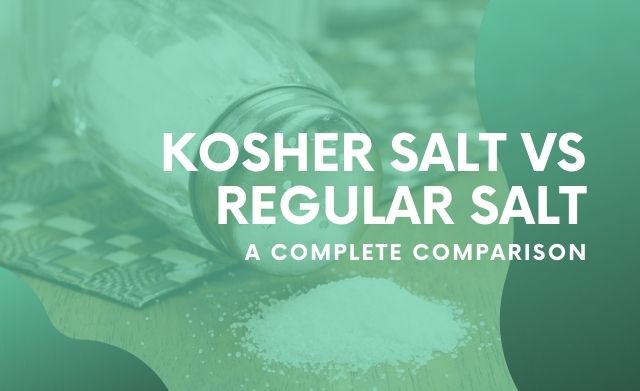
How much do you care about the type of salt you use in your kitchen? Most people don’t. After all, every salt contains sodium chloride(NaCl), and all salt is salty. Then why bother?
Well, they might not matter to you, but a chef will point out strong reasons for why different salt is meant for different purposes.
The importance of salt cannot be avoided, whether as an ingredient of our kitchen or as an essential element for our body. While excessive use of salt is harmful to our metabolism, on the other side, a deficiency might bring hyponatremia, intelligence disorder, or other health risks.
There are predominantly three basic types of salt: regular salt, kosher salt, and sea salt. This article is specifically dedicated to demonstrating the difference between kosher salt and regular salt.
Regular salt (also known as regular table salt, table salt, or fine table salt) is probably the most used salt worldwide. It’s well ground and fine in texture. On the other hand, kosher salt is coarse and has large flakes. Kosher salt is especially the best choice for koshering. That’s why it is called Kosher salt (Koshering salt would be a perfect term, though).
Technically, all salts are sea salts, even if they are collected from underground salt deposits. However, whether mined or collected directly from seawater, both source-salt require certain refine processes. The mineral content might vary based on their sources, but all types of salt are processed so that they can be ready for your kitchen.
However, the processing varies based on salts. While regular salt is refined heavily, kosher salt goes through less refinement than regular salt. Let’s move forward to know all the areas where they differ.
Table of Contents
Comparison chart
| Difference | Kosher salt | Regular salt |
| Source | Underground salt deposits and seawater both | Generally, underground salt deposits |
| Processing | Less processed | More processed |
| Texture | Large crystals, flaky | Small crystals and heavily ground |
| Weight | Weigh less | Weigh more |
| Anti-caking agents | Less | More |
| Iodine | No iodine | Usually Iodized |
| Price | Higher than table salt | Less than kosher salt |
Kosher salt
According to Jewish law, all blood must be drained out from the meat before making them ready for eating. Salts are usually responsible for this blood removal process, and the type of salt engaged in this needs to be coarse, flaky, and grainy.
For that reason, many people think the kosher salt got its name from Jewish customs, but actually, it’s not. This salt is called kosher salt because it meets all the requirements perfectly for koshering any meat.
Heavily ground salt like fine table salt will dissolve in meat too fast without removing the blood. Oppositely, too coarse and flaky salt will roll out. Hence, the type of salt we refer to as kosher salt has all the perfect texture and characteristics for the koshering process, and thus it’s called Kosher salt.
Kosher salt can either be collected from the seawater or the salt mines. Both processes, however, require evaporation. After the water is evaporated, sometimes some anti-caking agents like sodium ferrocyanide are added to the salt (the number of anti-caking agents added to kosher salt is less compared to the regular salt because the kosher salt is not much clump-tended). Kosher salt is made from large salt crystals, and because it’s not heavily ground, the texture remains flaky.
For the larger grains, kosher salt is less likely to clump together and easy to pinch. That’s why most chefs prefer this in their kitchen.
They are lighter in weight compared to the regular salt. One cup of kosher salt weighs around 288 grams on average. It increases the flavor of food and makes the food taste less salty. Kosher salt is the best choice for seasoning.
Although kosher salt costs more than regular salt, it’s still cheaper than sea salt. Salts like coarse sea salt, fine sea salt, coarse Himalayan pink salt can be a kosher salt substitute, but many pantries generally prefer kosher salt for the availability and price.
Regular salt
When we say iodized salt, we generally indicate regular salt. Although, it’s not necessary to have iodine in all of its types. The idea of adding minerals to salt came into existence in the 1920s to eliminate health problems like Goiter that are caused by a deficiency of iodine.
When we say kosher salt vs. table salt, probably one of the boldest differences pops up in our mind that the regular table salt has iodine present in it (not necessarily). In contrast, kosher salt doesn’t have that particular mineral present in it. Probably the only nutritional distinction between these two salts.
Generally, all regular salts are extracted from salt mines. They are highly refined or processed, and for that reason, the grains become smaller and tend to clump together. To prevent clumping, some anti-caking agents like calcium silicates need to be added to the salt.
For the bulk density, a tablespoon of regular salt weighs more and has much salting power than kosher or any other type of salt. So, adding a tablespoon of regular salt to the food differs significantly from adding a tablespoon of kosher salt. The increased amount of added salt might end up in bad-taste food items.
Although kosher salt is a better choice for seasoning than table salt yet, table salt performs well, especially in baking recipes.
The key differences between kosher salt and regular salt
- Kosher salt is coarse, flaky, and has larger crystals. On the other hand, regular salt has smaller grains, more density, and less coarse.
- The sources of kosher salt can be both salt mines and seawater. Conversely, the common source for regular table salt is underground salt mines.
- Kosher salt goes through less processing while regular salt is much processed.
- Kosher salt doesn’t have iodine, while generally, regular salt is iodized.
- The number of added anti-caking agents in kosher salt is less compared to the regular salt.
- Kosher salt is a better choice as a seasoning ingredient than regular salt.
- Kosher salt costs higher than regular table salt.
Kosher salt major brands difference
There are two major brands of kosher salt: the Diamond crystal and the Morton. So, which kosher salt is best? Not to mention, both the kosher salt brands taste the same in recipes. However, the only difference between these two brands is in the texture and size of the crystals. While the Morton brand is finer and denser, the diamond crystal kosher salt has larger grains.
One cup of Morton kosher salt weighs around 241 grams, while one cup of diamond crystal salt weighs only 137 grams. So, when added to the recipes, you should take the volume into account to achieve the perfect amount of saltiness.
Frequently asked questions (FAQs):
Is One Salt “Healthier” than the Others?
Chemically speaking, all salts are sodium chloride (NaCl). However, regular table salts usually contain iodine, which is a crucial mineral for our body. It prevents us from serious health risks like thyroid enlargement (Goiter), mental disabilities, hyponatremia, etc. On the other hand, excessive consumption of any type of salt can cause health risks like higher blood pressure.
Why Do Chefs Use Kosher Salt?
Most chefs use kosher salt because it’s easy to pinch and considered much purer as fewer anti-caking agents are added during processing. The saltiness can be measured easily and is granted as a perfect choice for seasoning and koshering.
Does himalayan salt have iodine?
Every salt contains some minerals naturally. Himalayan pink salt might have a small amount of iodine present naturally, yet the amount is significantly lower than any iodized salt.
Conclusion
The mother source of all salt is the sea, and they are all sodium chlorides(NaCl). Yet, there are various types of salts found on the market. One salt differs from the other based on processing, texture, usage, and other areas. While the kosher salt is coarse, flaky, and has large crystals, the regular salt is exactly the opposite. So whatever salt you use in your salt shaker or for your daily cooking might matter a lot. The difference between kosher salt and regular salt explained here in this article will help you to choose the appropriate type of salt in the future.

Craig is a full-time academic and research-based article writer from California. A trained content creator who started his career as a column writer for local magazines and newspapers. His works have been published on many renowned online platforms.
